Better Hearing Blog

Living with an Invisible Disability: The Story of Hearing Loss
Living with an invisible disability can be a challenging experience, particularly when it comes to hearing loss. Unlike physical disabilities visible, hearing loss is a hidden disability that often goes unnoticed. Those with hearing loss face unique challenges in their daily lives that can impact their communication, personal relationships, and overall quality of life.
Hearing Loss: A Disability You Can’t See
Hearing loss is a surprisingly common condition affecting people of all ages. It can range from mild difficulty hearing faint sounds to complete deafness. The impact of hearing loss can be challenging even when invisible to the naked eye.
Why is Hearing Loss Considered an Invisible Disability?
Unlike a physical disability like a broken leg or a chronic illness with visible symptoms, hearing loss isn’t readily apparent, leading to a unique set of challenges:
- Misunderstandings: People might misinterpret your struggle to hear as disinterest, inattentiveness, or even rudeness.
- Social Isolation: Difficulty following conversations can lead to withdrawal from social gatherings and feeling left out.
- Frustration and Fatigue: Straining to hear in noisy environments can be exhausting and lead to frustration.
- Unawareness: Sometimes, people with hearing loss might not fully recognize how much it impacts their lives.
Beyond the Invisibility: The Impact of Hearing Loss
The effects of hearing loss affect someone beyond social interactions. It can impact on:
- Work Performance: Difficulty hearing instructions or meeting participation can hinder work performance.
- Emotional Well-being: Feeling isolated and misunderstood can lead to loneliness and frustration.
- Health in General: Studies have shown a link between untreated hearing loss and cognitive decline.
Living with Hearing Loss: Strategies for Success
The good news is that hearing loss doesn’t have to define you. Here are some tips for managing hearing loss and thriving:
- Seek Professional Help: An audiologist can assess your hearing, recommend treatment options (including hearing aids if needed), and provide strategies for navigating daily life with hearing loss.
- Communication is Key: Openly communicate your hearing loss to friends, family, and colleagues. Let them know how they can support you, such as speaking, facing you while talking, and being patient with your responses.
- Explore Assistive Technologies: Hearing aids, amplified phones, captioning devices, and alert systems can significantly improve communication and independence.
- Join a Support Group: Connecting with others who understand the challenges of hearing loss can be a source of encouragement, practical advice, and a sense of belonging.
Introducing Better Hearing: Your Partner in Better Hearing
At Better Hearing, everyone deserves the gift of clear communication. We offer advanced diagnostic testing, the latest hearing aid technology, and ongoing support to empower you to manage your hearing loss and live a fulfilling life.
Schedule an appointment today and let us help you turn down the volume on the challenges of hearing loss and turn up the volume on a life filled with rich connections and clear communication.
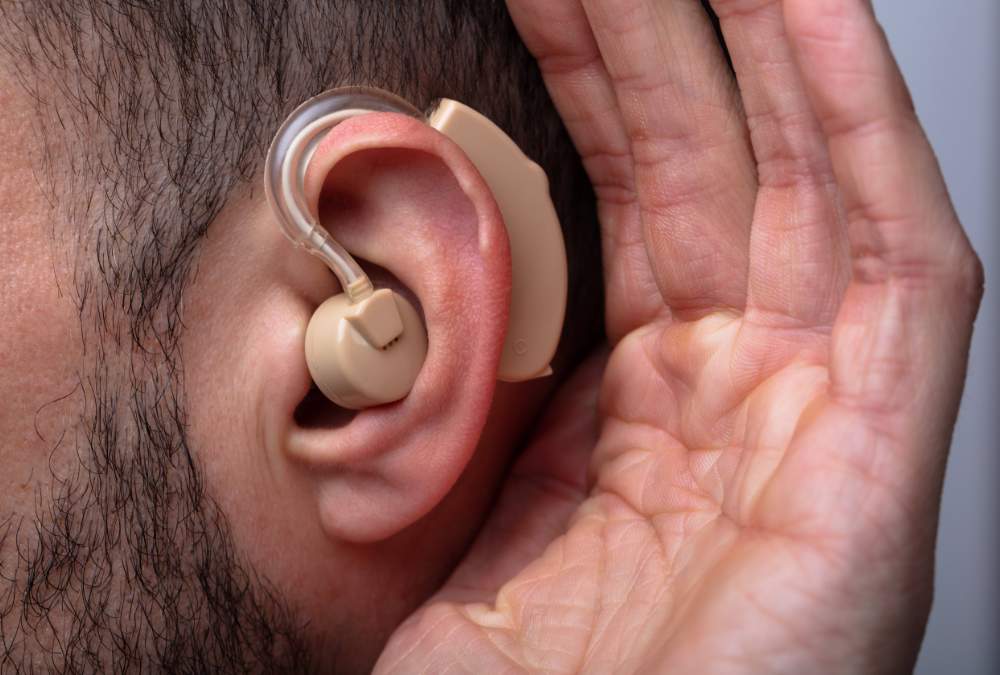
How To Tell If Your Hearing Aid Is Working Properly?
Hearing aids are unique technological marvels that help us reconnect with the world around us by amplifying sound and improving our ability to hear conversations and enjoy the full range of auditory experiences. But like any device, hearing aids require some TLC to ensure optimal performance.
How can you tell if your trusty hearing aid is functioning correctly? Here are some signs to watch out for:
Signs Your Hearing Aid Needs Attention:
- Silence or Muffled Sounds: This indicates that something might be wrong. Check the battery and ensure it is appropriately adjusted. If the sound remains muffled after a fresh battery, it’s time to visit your hearing professional.
- Volume Fluctuations or Whistling: Sudden changes in volume or a persistent whistling sound can be a loose battery compartment, earwax buildup in the receiver, or a malfunctioning device.
- Difficulty Hearing in Certain Situations: Are you struggling to follow conversations in noisy environments, or do you need to ask people to repeat themselves more often? You may need to adjust your hearing aid settings or indicate a decline in your hearing requiring reevaluation.
- Physical Discomfort: If your hearing aid is causing any pain or irritation, it could be due to a poor fit or malfunction.
Do Hearing Aids Have Settings and Failure Signals?
Many hearing aids come equipped with adjustable settings that allow you to customize the listening experience based on your environment. These settings might control volume, noise reduction, or focus on specific sound frequencies.
While some hearing aids might emit a soft beep or chime when turned on or switched between programs, they typically don’t have specific “failure signals.” However, the above signs can indicate that your hearing aid needs attention.
Keeping Your Hearing Aids in Top Shape:
Do this to ensure your hearing aid is function optimally:
- Regular Cleanings: Clean your hearing aids with a soft, dry cloth to remove earwax buildup.
- Battery Care: Change batteries as your hearing professional recommends, and avoid storing them in extreme temperatures.
- Scheduled Appointments: Schedule regular checkups with your hearing specialist to monitor your hearing health and ensure your hearing aids function correctly.
Introducing Better Hearing: Your Hearing Care Partner
At Better Hearing, our team of dedicated audiologists offers comprehensive hearing care services, including hearing aid evaluations, programming, cleaning, and repairs. We understand the importance of clear communication and are committed to helping you get the most out of your hearing aids.
Schedule an appointment today and let our experts ensure your hearing aids are correctly functioning so you can continue to experience the joy of clear and vibrant hearing!
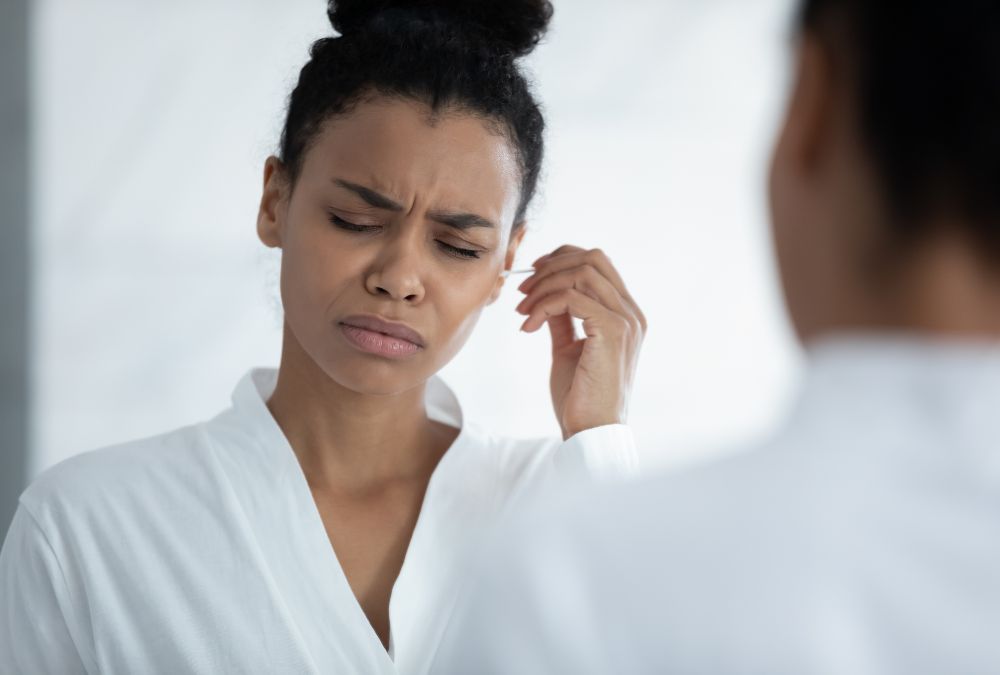
Does Cleaning My Ears Put Me at Risk for Hearing Loss?
Our ears are like self-cleaning wonders! They produce earwax, a sticky substance that traps dust, dirt, and even dead skin cells. This wax naturally dries out and migrates out of the ear canal, keeping our ears healthy and functioning correctly. However, sometimes earwax buildup can occur, causing discomfort and even temporary hearing loss, and at that moment, we ask ourselves: Should we clean our ears, and if so, how?
The Q-Tip: More Harm Than Good
Cotton swabs, or Q-tips, seem like a handy tool for ear cleaning, but using them in the ear canal can be pretty dangerous. Here’s why:
- Pushing the Problem: Q-tips can quickly push earwax deeper into the canal, causing a blockage that can worsen hearing loss.
- Eardrum Danger Zone: The eardrum is a delicate membrane. A misplaced Q-tip could scratch or puncture it, leading to pain, infection, and potentially permanent hearing loss.
Safe and Effective Ear Cleaning Methods:
Fortunately, there are safer ways to manage earwax buildup:
- Warm Water Irrigation: A bulb syringe filled with warm water can gently soften and dislodge earwax. However, avoiding excessive force or using too hot water is crucial.
- Over-the-Counter Drops: Certain drops containing hydrogen peroxide, mineral oil, or carbamide peroxide can help soften earwax, making it easier to come out naturally. Remember to consult with your doctor if you have any pre-existing ear conditions.
- Let Nature Take its Course: In most cases, earwax eventually exits the ear canal. Our body’s natural chewing motion helps move earwax outward.
When to See a Hearing Specialist:
If you experience any of the following, it’s best to consult a hearing professional:
- Persistent earaches
- Muffled hearing or feeling plugged-like ears
- Dizziness or vertigo
- Ringing in the ears (tinnitus)
- Any concerns about earwax buildup
A hearing specialist can safely remove excess earwax using specialized tools and techniques. They can also provide personalized advice on earwax management and overall ear health.
Introducing Better Hearing: Your Partners in Healthy Hearing
At Better Clinic NH, our team of experienced and licensed audiologists offers comprehensive hearing care services, including safe and effective earwax removal. We utilize state-of-the-art technology and prioritize patient comfort during every appointment. We aim to help you hear your best and live a life enriched by clear communication.
Remember: When it comes to earwax, it’s often best to leave it alone or seek professional help. By prioritizing safe cleaning methods and consulting a hearing specialist when needed, you can avoid risking your hearing and keep your ears healthy for years to come.
Schedule an appointment today, and let us help you experience the joy of clear and vibrant hearing!
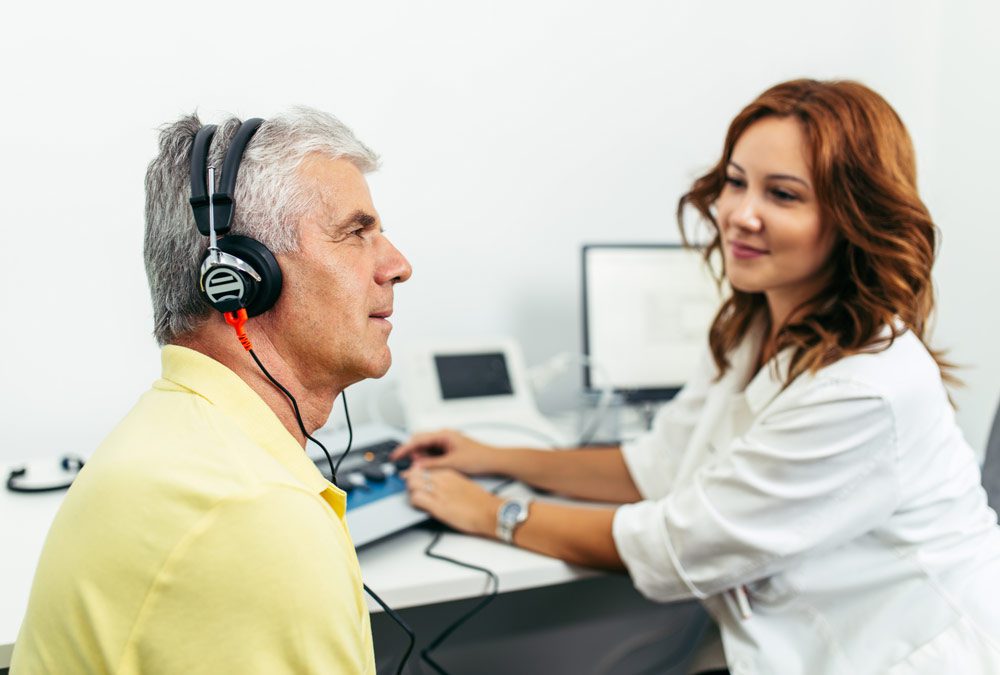
What Should I Expect at an Audiology Appointment?
Never been to an Hearing Care Provider before? The prospect of your first appointment might seem a little daunting. However, the process is straightforward and focused on helping you achieve optimal hearing health. Here’s a guide on what to expect at your initial audiology appointment.
Scheduling the Appointment
Once you’ve decided to prioritize your hearing health, the first step is scheduling an appointment online with your trusted Hearing Care Provider. At The Better Hearing Center, we are dedicated to providing patient-centered care that addresses your hearing problems and help to prevent further issues.
New Patient Intake Form
Before your appointment, you’ll likely be asked to download and fill out a new patient intake form. This form collects essential information about your medical history, any hearing concerns you might have, and your lifestyle. This information is crucial for the Hearing Care Provider to understand your unique needs and tailor their approach accordingly.
Warm Welcome and Preliminary Discussion
Upon arriving at the Better Hearing Center, you’ll receive a warm welcome from our staff. We understand this might be a new experience for you, and we’ll make every effort to ensure you feel comfortable. You’ll have an opportunity to discuss your immediate concerns or questions.
Comprehensive Hearing Evaluation
The heart of your audiology appointment is the comprehensive hearing evaluation. This series of tests is designed to assess the status of your hearing. The Hearing Care Provider will likely use a variety of methods, including pure-tone audiometry, speech audiometry, and potentially other advanced assessments. These tests will help determine the extent of your hearing loss, if any, and its specific characteristics.
Personalized Treatment Options
Once the evaluation is complete, the Hearing Care Provider will discuss the results with you. They will explain the findings in a clear and understandable manner. If hearing loss is detected, we will go over the degree of loss, the potential causes, and how it might impact your daily life. The Hearing Care Provider will then present personalized treatment options. This might include recommendations for hearing aids, cochlear implants, assistive listening devices, or other interventions.
Ongoing Customer Service
At the Better Hearing Center, the relationship doesn’t end after your appointment. Every hearing device you purchase comes with a high level of ongoing customer service at no extra charge. This ensures that your chosen device continues to meet your expectations over time.
Book an Appointment Today
Your first audiology appointment at the Better Hearing Center is designed to be a supportive and informative experience. Our patient-centered approach and personalized treatment options are designed for your better hearing health. Schedule your appointment and take the important step towards reconnecting with life through improved hearing.
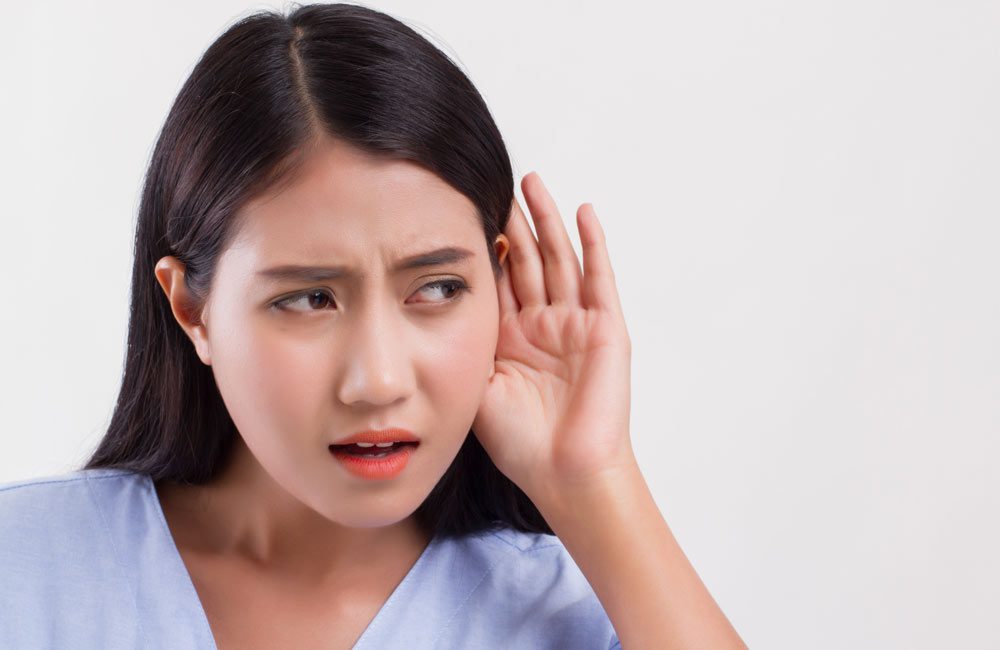
Am I Hard of Hearing or Am I Losing My Hearing?
In audiology, the terms “hard of hearing” and “hearing loss” are often used interchangeably, yet they encompass distinct aspects of auditory health. It’s important to recognize the differences between these terms to comprehend your auditory experiences better and seek appropriate solutions.
Hard of Hearing
Being “hard of hearing” generally refers to a mild to moderate reduction in auditory sensitivity. If you are hard of hearing, you may experience difficulty discerning certain sounds, particularly in noisy environments or when conversing with soft-spoken individuals. While you may benefit from hearing aids or other amplification devices, your overall communication abilities remain relatively intact.
Hearing Loss
On the other hand, “hearing loss” is a broader term that encompasses a wider range of auditory impairments. It refers to a diminished ability to perceive sounds across various frequencies and intensities. Hearing loss can range from mild to profound, often impacting an individual’s ability to communicate effectively and engage with their surroundings. It often necessitates the use of hearing aids to facilitate communication and maintain a good quality of life.
Key Differences
Severity of Impairment
The primary distinction between being hard of hearing and experiencing hearing loss lies in the severity of auditory impairment. Hard of hearing individuals have a relatively minor reduction in hearing ability, while hearing loss can manifest as a more significant and encompassing deficit.
Communication Challenges
If you are hard of hearing, you may encounter occasional challenges in communication, especially in specific situations. In contrast, if you have hearing loss, you will face consistent difficulties in understanding speech, following conversations, and perceiving environmental sounds.
Treatment and Intervention
Both hard of hearing and hearing loss individuals may benefit from hearing aids, but the extent of intervention often varies. Hard of hearing individuals might rely on hearing aids primarily in certain scenarios, while those with hearing loss typically require consistent device usage to enhance their overall hearing ability.
Impact on Lifestyle
While being hard of hearing might have a relatively modest impact on one’s lifestyle, hearing loss can influence various aspects of daily life. Hearing loss can lead to social isolation and depression, affect personal relationships, and hinder professional pursuits. This underscores the significance of early intervention and effective management of hearing loss problems.
Seek Help for Your Hearing Issue
Hard of hearing and hearing loss represent distinct degrees of auditory impairment, each requiring a tailored approach to intervention and support. Whatever category you fall into, the journey toward improved auditory health begins with consulting a professional. Contact us or book an appointment with an audiologist to help you resolve your hearing issue.
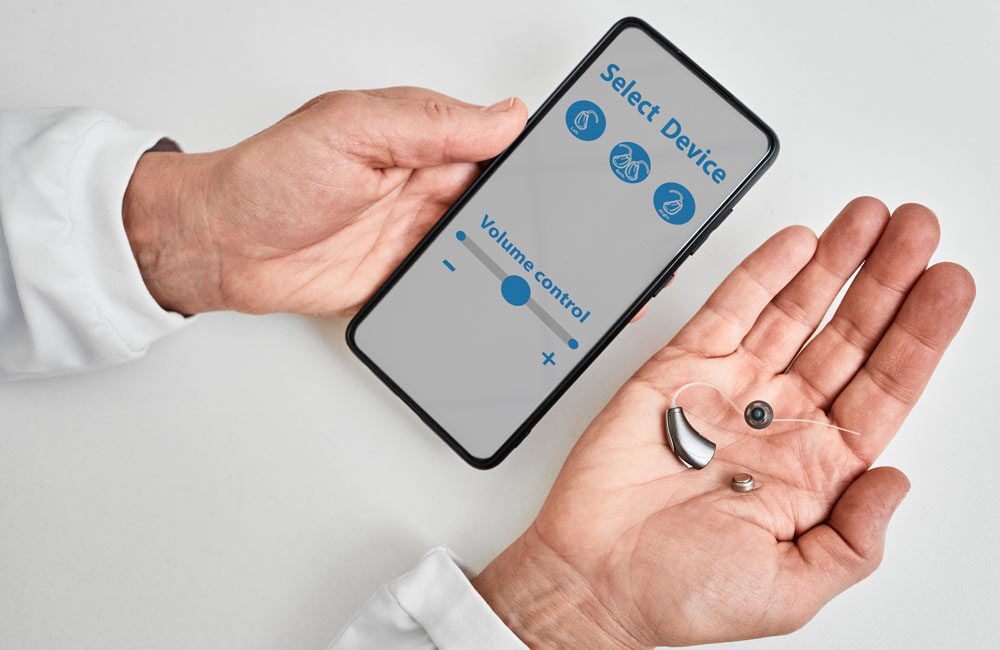
Are There Smartphones Compatible With My Hearing Aid?
Staying connected is paramount, and technology has paved the way for improved communication for those with hearing difficulties. One such advancement is the compatibility between hearing aids and smartphones. This groundbreaking integration has brought about a positive shift in the lives of individuals seeking clearer communication and enhanced connectivity.
Can Smartphones Be Compatible With Hearing Aids?
The answer is a resounding yes. Thanks to technological innovations, hearing aid manufacturers have recognized the importance of ensuring their devices can seamlessly interact with smartphones.
Many modern hearing aids are equipped with Bluetooth capabilities to establish a connection with smartphones effortlessly. In addition, the Federal Communications Commission (FCC) passed a requirement that all smartphones be Hearing Aid Compatible (HAC). Thus, you can be sure your smartphone is compatible with hearing aids.
Can They Be Connected To Hear Phone Calls?
Smartphones can be connected to hearing aids to facilitate phone calls. This connection is established through technologies like Bluetooth to allow seamless communication between the two devices.
One of the most beneficial aspects of this connection is the ability to stream audio directly from the smartphone to the hearing aids. This includes not only phone calls but also music, podcasts, audiobooks, and more. Such a feature enhances the listening experience, ensuring the user enjoys crisp and clear sound without external disturbances.
Although smartphones come with Hearing Aid Compatibility, considering their M rating is crucial when choosing a smartphone. This rating, graded on a scale of 1 to 4, indicates how well the smartphone can work with hearing aids without causing electromagnetic interference.
In addition, it is important to select a smartphone with a higher M rating, as it signifies better compatibility with hearing aids. A higher rating, closer to 4, suggests that the smartphone has been tested and approved for minimal electromagnetic interference, ensuring a clear and effective listening experience when using your hearing aid.
Get Help for Your Hearing Issue
Integrating smartphones with hearing aids is a significant leap forward in improving the quality of life for individuals with hearing difficulties. At Better Hearing Center, our wide range of hearing aid options compatible with smartphones will help you stay connected to the moments that matter. Contact us today to schedule a consultation and take the first step toward improved hearing and enhanced quality of life.
